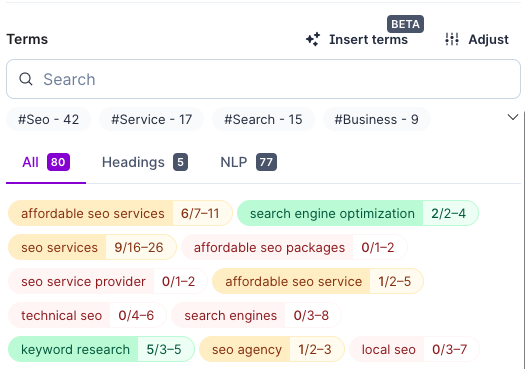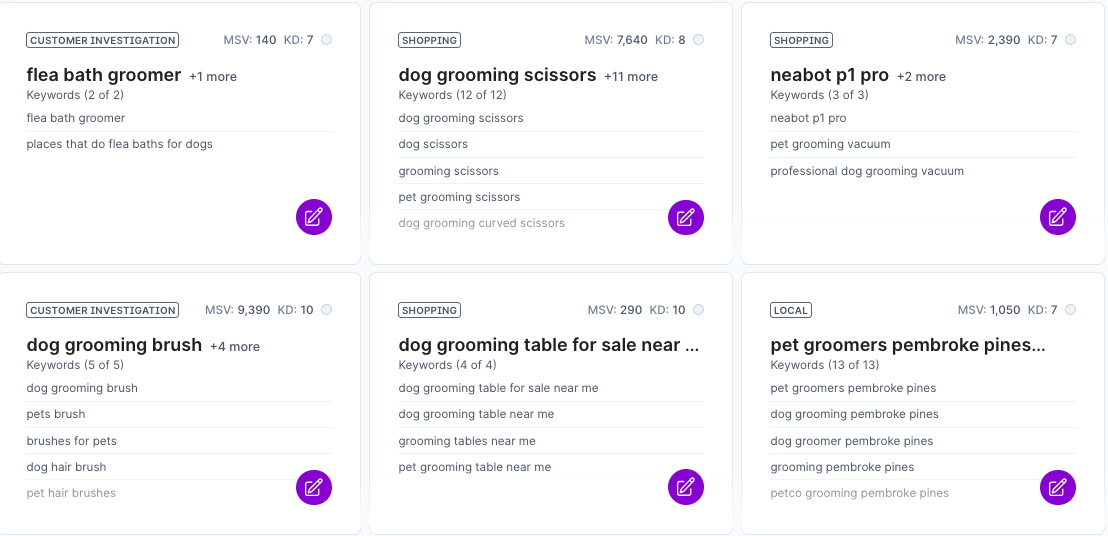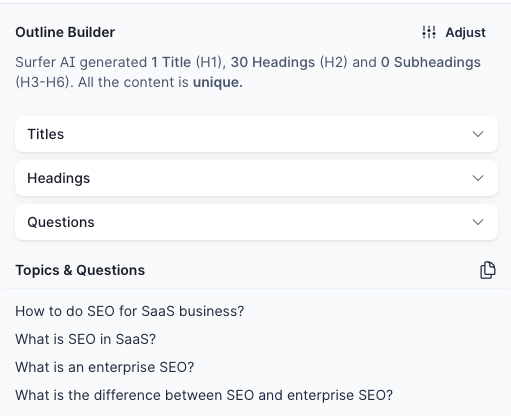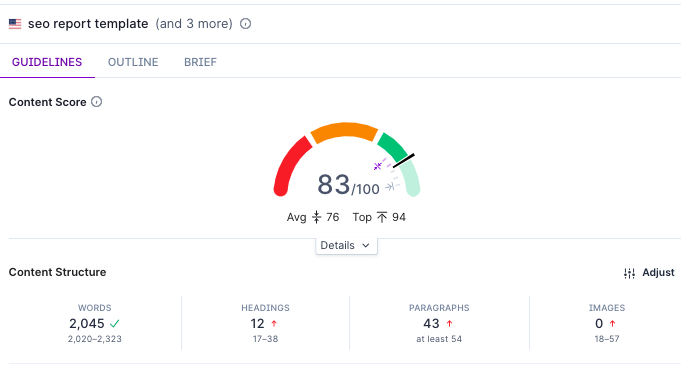As an SEO, content manager or website owner who wants to grow organic traffic to their website, you will often find ourselves with the challenge of determining which tasks will have the most impact and should be tackled first.
Success with SEO often boils down to prioritizing important tasks in a limited time.
Should you create more content, update old content or build links to your articles.
A US based digital marketing agency in the healthcare industry was able to use Surfer to resolve this dilemma to a significant extent. In the process, they saved 60% of the time they were spending in keyword research and content publishing.
That's especially amazing because Google and other search engines favor new content and a healthy publishing frequency.
The faster your website can produce high quality content, the better your chances are of ranking well, getting out of the sandbox quickly, or being recognized as a trusted source of authority.
In this SEO case study, we'll explore 5 ways that this digital marketing agency used Surfer to improve high quality content publishing by 247%.
1. Streamline keyword and topical research
Conducting keyword research is a time and skill intensive process so it's no surprise that the agency’s founder, Eric attributes their biggest gains to Surfer's tools at this stage.
Before Surfer, Eric’s team used a popular keyword research tool for their needs but found that it wasn't as efficient for their process.
The challenge with most keyword research tools is that they provide you with a database of keywords and related metrics but don't really help you make a decision.
They're still relying on you to be the SEO expert.
And so ultimately, it is left up to your SEO knowledge and experience to identify the right keywords for your article.
Surfer's Content Editor provides you with a list of suggested keywords that are associated with your article's main keyword. Those highlighted in green are in the optimal range while those highlighted in yellow have scope for improvement.

Using these keywords within Surfer's recommended frequency can help your article be seen as an authoritative source of information by search engines, thus improving your chances of ranking higher.
Using Content Editor meant that the agency’s team did not have to spend the time and effort picking out what they deemed relevant keywords for their content.
The agency also spent significant time creating topical clusters in a bid to establish subject expertise in the eyes of search engines.
Grouping semantically relevant subtopics to create content hubs can be a tricky and time consuming process, even for seasoned SEOs.
So it's no surprise that Eric’s team dedicated their efforts here.
Surfer's Keyword Research Tool builds a content plan that is personalized for your website, based on topics you've already covered and those you should go after.
For example, here's a list of topics you should write about if you are in the pet grooming industry.

Before using Surfer, their agency spent an average of 90 minutes manually identifying and clustering keywords from other top ranking pages for each article.
They were able to halve this time by using Surfer to automate the process and significantly reduce the time spent on keyword identification.
2. Analyze competitors to build outlines
The marketing agency would gather the top 10-20 competitors for their target keyword and study them in detail to build content outlines for their article.
This is a smart approach to writing rankable content because you're using information that is already favored by the search engines.
However, imagine the time and effort this takes.
Using Surfer Content Editor, the agency was able to reduce their content outline planning by almost 70% of the time it originally took.
Instead of manually looking for competitors, you can select your organic competitors inside the Editor's settings. This will tell Surfer which pages to study for your content optimization.

You can also choose between generating an article outline or using AI to write your blog post inside the editing window.

Of course, you'll be given the option to edit the outline based on your preferences.
If you prefer writing outlines yourself, the Outline Builder in the right panel can help offer inspiration for your headers and subtopics within the article.

3. Optimize content for search engines
Eric and his team were relying on manually identifying keywords for their articles. However, since this was a subjective process, they had no way of assessing whether their content sufficiently covered relevant keywords.
So what they'd do is review the article's performance after a month, and then revisit the keyword insertion process.
You can see why this is a cumbersome process that could get challenging with more content. What they really needed was a data-backed approach to keyword optimization.
They were able to do this using Surfer's Content Score which tracks keyword insertion for your content and even warns you against keyword stuffing.

It even breaks down your word count and content structure by headings, paragraphs and images. Surfer Content Editor also provides tools to check plagiarism for your content.
As a result of all these advantages , Eric and his team were able to reduce their editing time by almost 60% of what it would normally take them.
"Rather than having to float an initial draft, get a sense of performance after a month then audit it and improve based on a subjective sense of the article’s completeness, the scoring system of Surfer gives us a better framework for auditing"
- Eric, founder at the healthcare marketing agency
4. Update existing content
The team at the marketing agency was able to leverage Surfer Audit to update old posts.
This is a great move because these pages are already ranking and updating them will trigger a relook on Google's behalf.
This can lead to better rankings and tell search engines that the content on your website is updated and taken care of.
Entering a URL on Surfer Audit will generate a report for your URL's content health. You will be able to see which terms and keywords you are missing and should have, as well as information on your metadata and internal linking.
Here’s a snippet of the Word count report.

The agency uses Surfer Audit to review older articles that may have room for improvement.
As well as to analyze important pages that can potentially rank higher.
5. Scale their SEO processes
As a result of using Surfer, the marketing agency saved 60% of it's time that would have been spent manually auditing and optimizing their content.
In the SEO business, time is money and so we can only imagine how many hours were better allocated to more important tasks for their agency.
Their clients also benefited from the speed as Eric’s team improved their content velocity by 247%, seeing SEO results in less time.
The agency was also able to focus on creating more growth opportunities for themselves as a result of using Surfer's tools.
While Surfer AI was not featured in this case study, we believe that the marketing agency will see even more benefits from using our AI generative tool.
Writing often takes the most significant part of content creation and having an optimized article ready in just 20 minutes could potentially have an even higher impact on the agency’s productivity and efficiency.
Final thoughts
Eric’s marketing agency stands out in terms of how they have managed to improve their content creation process.
This highlights the importance of speed in SEO. But speed without quality is nothing.
You need to create high quality content frequently to succeed in content marketing.
I believe the team can still improve their processes, but the five points above were the most interesting at this time.
If you have any ideas, or maybe even want to tell us about your success with Surfer for an SEO case study, feel free to reach out on Twitter or X.

